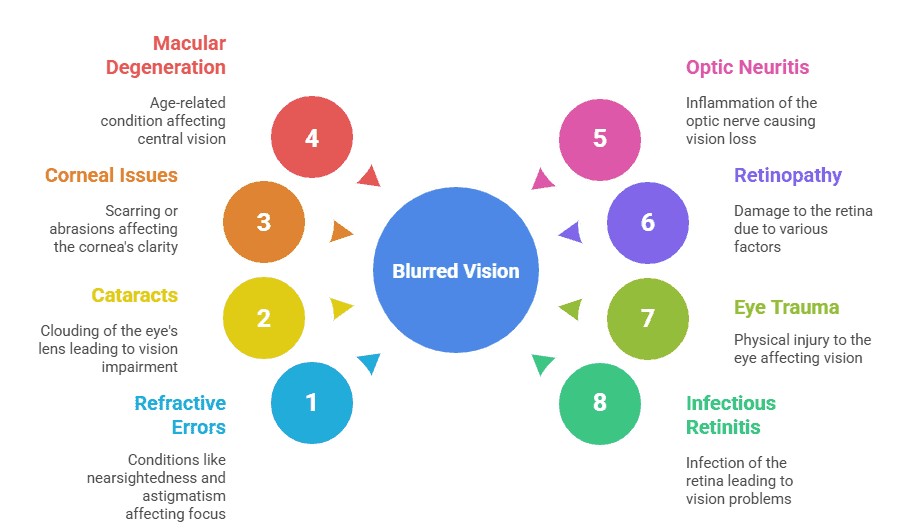
Last Updated on October 4, 2025 by Aaron Barriga
The majority of people who have difficulty seeing make a very common mistake when describing their poor vision. They interchangeably use the terms blurry vision and cloudy vision. However, there is a thin line of difference between these terms. Both of them can be caused due to very different reasons.
So, let’s find out what exactly these conditions are and understand their causes.
What is Blurry Vision?
Blurry vision is when the object you are looking at appears to be out of focus. In such a condition, you may feel that squinting will make the object clearer. One of the best examples of blurry vision is the way an image appears on camera before you adjust the lens or give it a moment to focus on the subject. Symptoms include poor peripheral or, left or right field of vision.
What are the Causes of Blurry Vision?

There are multiple factors that can cause blurry vision. Some of the most common ones are as follows:
- Near-sightedness, far-sightedness, or astigmatism
- Cataracts
- Corneal scarring or opacification
- Abrasions to the cornea
- Age-related macular degeneration
- Optic Neuritis
- Retinopathy
- Injury or trauma to the eyes
- Infectious retinitis
Some conditions, in particular, can cause headaches as well as blurry vision. These include migraine, low blood sugar, stroke, etc.
What is Cloudy Vision?
Cloudy vision is when it feels like you are looking at everything through a haze or fog. You might feel like there is a blurry film on your eyes, and you can almost wipe or blink it away. For instance, looking through smudged glasses or through a window on a foggy morning is what having a cloudy or foggy vision feels like. It can be caused due to different reasons. Hence, the combination of its symptoms depends on the underlying cause. Its commonly occurring symptoms are as follows:
- Double vision
- Appearance of halos around lights
- Light sensitivity
- Watery or dry eyes
- Poor nighttime vision
- Bloodshot or red eyes
What are the Causes of Cloudy Vision?
One of the most common eye condition which causes cloudy vision is cataracts. As a part of the aging process, the lens of the eye loses its transparency in cataracts. Hence, it is generally seen in older people. Dirty or damaged contact lenses are also a very common factor resulting in cloudy vision. Besides, if the contacts are worn for too long, eyes become overly dry and can result in cloudy or blurred vision.
Other causes include changes in or damage to the cornea due to infections or inflammations. Also, conditions such as macular degeneration, optic nerve disease and diabetes may cause your vision to turn cloudy.
Since blurry vision and cloudy vision both can indicate the presence of certain serious health issues, it’s important to get your eyes regularly checked. An ophthalmologist can identify early signs of eye health issues and even detect related signs of other underlying diseases.
If you, too, are experiencing any symptoms of either blurry or cloudy vision, or have any queries related to eye health, get in touch with us. Our experienced team at InSight Vision Center can help you with any queries or issues related to vision and eye health.

Dr. Azhar I. Salahuddin is an ophthalmologist and is fellowship-trained in cornea, external diseases, and refractive surgery. Dr. Salahuddin has been performing cataract surgery for over 19 years and specializes ocular reconstruction, corneal transplantation surgery as well as vision correction through a variety of intraocular lenses. Dr. Salahuddin is board-certified by the American Board of Ophthalmology and was trained at Boston University.

